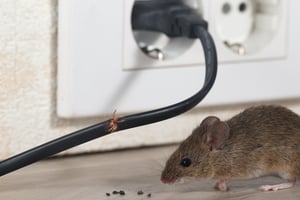 Rodent infestations can cause all sorts of destruction in your house, from messy droppings to structural damage and more. Unlike your auto policy, most homeowner’s insurance policies don't cover rodent damage and removal.
Rodent infestations can cause all sorts of destruction in your house, from messy droppings to structural damage and more. Unlike your auto policy, most homeowner’s insurance policies don't cover rodent damage and removal.
Since infestations and the damage resulting from rats and mice are usually considered home maintenance matters, the homeowner is responsible for paying for repairs and pest control methods.
Rodents (typically rats, mice, and squirrels) are most commonly found in your walls, roof spaces, cupboards, and storage areas, so it might be difficult to detect them immediately.
Here are a few clues that you might have an infestation:
1. Droppings.
The most common sign that you have a rodent problem is droppings. Droppings usually look like tiny grains of black rice and are often found where food is kept, under sinks, along baseboards, on top of wall beams, and inside cardboard boxes.
2. Odd noises.
Scurrying in your walls, attic, or even right across your living room — mainly at night. If you're worried about critters getting to family heirlooms or other valuables in your attic or storage areas, it's best to store those items in sealed plastic containers rather than cardboard boxes that they can easily chew through.
3. Gnaw marks.
Rodents can cause significant damage just by chewing. In addition, they can chew through materials you wouldn't even suspect — including pipes and electrical wiring.
4. Nests
You might not see the nest at first, but you’ll notice materials typically used to build them (shredded paper, packing materials, cotton, fabric, and wall insulation) around your home.
5. Tracks.
Rats’ naturally oily fur attracts all kinds of dirt and grease. After a few trips between their nest and their food source, they often start leaving dark tracks or rub marks along your home's floorboards and walls. These tracks are often signs of rats, as opposed to signs of mice, which can help you narrow down which rodent you're dealing with.
Here are some tips to help you get rid of them:
1. Simple home maintenance.
Keep the house clean, practice good sanitation, and patch up any openings in the home. Rodent proof areas where you keep food by using plastic and glass containers instead of cardboard they can easily chew through. Since droppings can trigger allergies, carry harmful bacteria, and even transmit serious diseases like salmonella, it’s essential to use gloves and antiseptic spray to quickly clean up the mess and dispose of it outside your house.
2. Poisonous baits.
These are not always the best options. Rodents tend to die in hard-to-reach areas and it’s difficult to locate the dead animal to get rid of the odor. Pets can accidentally ingest these products, as well.
3. Ultrasonic sound.
With this method, the sound loses its intensity quickly with distance, and it can’t penetrate behind objects like furniture or walls. Rodents already in the home can quickly get used to any sounds that may initially affect them.
4. Pest control professional.
This is your safest option; they know how to locate rodents and they have the proper clothing and equipment to thoroughly extricate rodents from your home. This helps keep you and your family from exposure to health hazards during removal and cleanup.
It's always wise to speak with your insurance agent about what kind of protection your specific home coverages can provide.
Do you have any tips you’d like to share? I’d love to hear your thoughts; please share them in the box below.
This blog was written by Wendy Wagner a senior Personal Lines underwriter.
This article is intended for general educational and illustrative purposes only and should not be construed to communicate legal or professional advice. Further, this article is not an offer to sell insurance. Please consult with your licensed insurance agent for specific coverage details and your insurance eligibility. All policies are subject to the terms, conditions, limitations, definitions, and exclusions contained therein.





